#Largest market in Africa
Text
Mastering SEO in Nigeria: How to Optimize for Local Search Visibility in 7 Steps
As a brand, targeting a local audience, one of the secret game changing plans you can use right now is to understand the local SEO in Nigeria, engage in geo-targeting to gain razor-sharp visibility and then evolve pragmatic regional and industry focused strategies to drive your outcomes.
This is what your favorites brands are doing to gain the needed boost in visibility, improve traffic and…
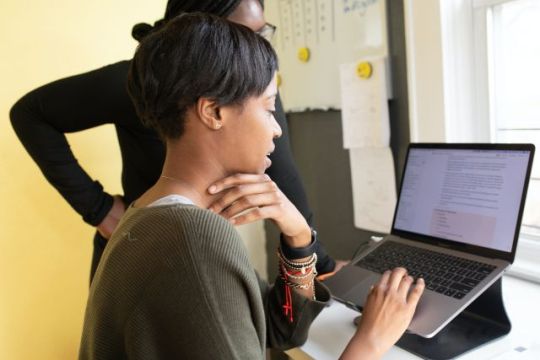
View On WordPress
#Largest market in Africa#Local search#Local SEO#Local SEO in Nigeria#Optimize local search fast#Rank for local search#SEO in Africa
0 notes
Text
Exploring the Heart of West Africa: A Travel Guide to Burkina Faso
Burkina Faso, nestled in the heart of West Africa, offers an enriching blend of history, culture, and natural beauty. Known as the “Land of Upright People,” this country is a hidden gem waiting to be discovered by intrepid travelers. This guide will walk you through the essentials of visiting Burkina Faso, from its rich history to practical travel tips and must-see attractions.
A Brief History…

View On WordPress
#" this country is a hidden gem waiting to be discovered by intrepid travelers. This guide will walk you through the essentials of visit#1960. The post-independence period saw several political upheavals#A Brief History of Burkina Faso#Acceptable credit cards in Burkina faso#Accommodation and Affordability#Accommodation ranges from budget hostels to mid-range hotels and luxury lodges. Prices are generally affordable#Activities for Tourists in Burkina Faso#adventure#africa#along with international organizations#and art scenes. Traditional music features instruments like the balafon and kora#and brochettes (grilled meat skewers).#and Lake Tengrela#and lodging are affordable#and maize. Popular dishes include tô (a type of porridge)#and natural beauty. Known as the "Land of Upright People#and rich cultural traditions.#and stay informed about the local situation.#and taxis.#and the bustling markets to experience local life. Bobo-Dioulasso The country&039;s second-largest city#and the country is known for its lively festivals and ceremonies.#and traditional African religions being practiced. Respect for religious customs is essential.#and you can exchange money at banks#avoid risky areas#Banfora Famous for its natural attractions#Before the advent of European colonization#Burkina Faso#Burkina Faso boasts a rich cultural heritage#Burkina Faso gained independence from France on August 5#Burkina Faso has experienced political instability
0 notes
Text
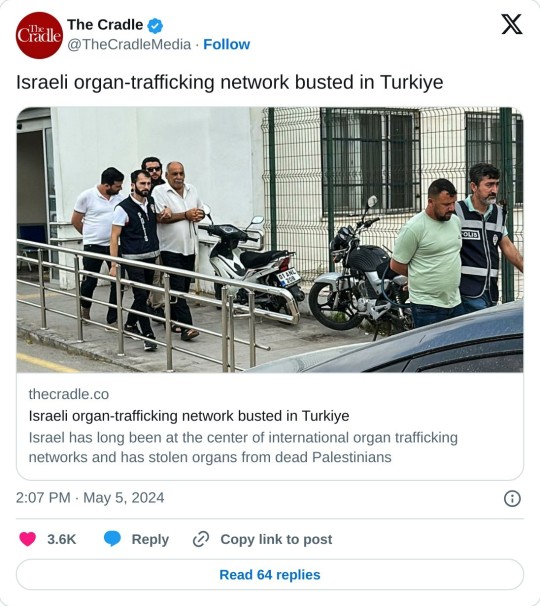
Police in the Turkish city of Adana detained 11 suspects, five Israeli and two Syrian, on allegations of organ trafficking, the Daily Sabah reported on 5 May.
The Provincial Directorate of Security's Anti-Smuggling and Border Gates Branch began investigating after examining the passports of seven individuals who arrived in Adana from Israel about a month ago by plane for the purpose of health tourism. The two Syrian nationals, ages 20 and 21, were found to have fake passports.
Further investigation revealed that Syrian nationals had each agreed to sell one of their own kidneys to two of the Israeli nationals, ages 68 and 28, for kidney transplants in Adana.
During searches at the suspects' residences, $65,000 and numerous fake passports were seized.
Israel has long been at the center of what Bloomberg described in 2011 as a “sprawling global black market in organs where brokers use deception, violence, and coercion to buy kidneys from impoverished people, mainly in underdeveloped countries, and then sell them to critically ill patients in more-affluent nations.”
The financial newspaper added, “Many of the black-market kidneys harvested by these gangs are destined for people who live in Israel.”
The organ-trafficking network extends from former Soviet Republics such as Azerbaijan, Belarus, Ukraine, and Moldova to Brazil, the Philippines, South Africa, and beyond, the Bloomberg investigation showed.
Accusations of Israeli involvement in organ trafficking also apply to the occupied Palestinian territories. In 2009, Sweden's largest daily newspaper, Aftonbladet, reported testimony that the Israeli army was kidnapping and murdering Palestinians to harvest their organs.
The report quotes Palestinian claims that young men from the occupied West Bank and Gaza Strip had been seized by the Israeli army, and their bodies returned to the families with missing organs.
"'Our sons are used as involuntary organ donors,' relatives of Khaled from Nablus said to me, as did the mother of Raed from Jenin as well as the uncles of Machmod and Nafes from Gaza, who all had disappeared for a few days and returned by night, dead and autopsied," wrote Donald Bostrom, the author of the report.Bostrom also cites an incident of alleged organ theft during the the first Palestinian intifada in 1992. He says that the Israeli army abducted a young man known for throwing stones at Israeli troops in the Nablus area. The young man was shot in the chest, both legs, and the stomach before being taken to a military helicopter, which transported him to an unknown location.
Five nights later, Bostrom said, the young man's body was returned, wrapped in green hospital sheets.
Israel’s Channel 2 TV reported that in the 1990s, specialists at Abu Kabir Forensic Medicine Institute harvested skin, corneas, heart valves, and bones from the bodies of Israeli soldiers, Israeli citizens, Palestinians, and foreign workers without permission from relatives.
The Israeli military confirmed that the practice took place, but claimed, "This activity ended a decade ago and does not happen any longer."
Israel’s assault on Gaza since 7 October has provided further opportunities for the theft and harvesting of Palestinians’ organs.
On 30 January, WAFA news agency reported that the Israeli army returned the bodies of 100 Palestinian civilians it had stolen from hospitals and cemeteries in various areas in Gaza.
According to medical sources, inspection of some of the bodies showed that organs were missing from some of them.
On 18 January, the Times of Israel reported that the Israeli army confirmed reports that its soldiers dug up graves in a Gaza cemetery, claiming its soldiers were trying to “confirm that the bodies of hostages were not buried there.”
#yemen#jerusalem#tel aviv#current events#palestine#free palestine#gaza#free gaza#news on gaza#palestine news#news update#war news#war on gaza#human rights#war crimes#gaza genocide#genocide
6K notes
·
View notes
Text
Nestlé, the world’s largest consumer goods company, adds sugar and honey to infant milk and cereal products sold in many poorer countries, contrary to international guidelines aimed at preventing obesity and chronic diseases, a report has found.
Campaigners from Public Eye, a Swiss investigative organisation, sent samples of the Swiss multinational’s baby-food products sold in Asia, Africa and Latin America to a Belgian laboratory for testing.
The results, and examination of product packaging, revealed added sugar in the form of sucrose or honey in samples of Nido, a follow-up milk formula brand intended for use for infants aged one and above, and Cerelac, a cereal aimed at children aged between six months and two years.
In Nestlé’s main European markets, including the UK, there is no added sugar in formulas for young children. While some cereals aimed at older toddlers contain added sugar, there is none in products targeted at babies between six months and one year.
Laurent Gaberell, Public Eye’s agriculture and nutrition expert, said: “Nestlé must put an end to these dangerous double standards and stop adding sugar in all products for children under three years old, in every part of the world.”
Obesity is increasingly a problem in low- and middle-income countries. In Africa, the number of overweight children under five has increased by nearly 23% since 2000, according to the World Health Organization. Globally, more than 1 billion people are living with obesity.
continue reading
1K notes
·
View notes
Text
GoviEx Uranium (TSXV: GXU) no longer has rights over the perimeter of the Madaouela mining permit following the Niger government’s decision on Thursday to withdraw its licence, dealing a big blow to the development of one of the world’s largest uranium projects.
The Vancouver-based uranium miner had feared that its licence could be revoked if mining could not start by July 3, 2024, a deadline set by Niger’s military leaders who came into power around this time last year.[...]
According to the World Nuclear Association, Niger is a top 10 uranium producer in the world and the second-largest producer in Africa. The ruling government currently has a 20% stake in GoviEx’s Madaouela project, which contains one of the largest uranium resources globally.[...]
Since January, Niger has temporarily suspended the granting of new mining licences and also ordered an audit of the sector. Madaouela now represents the second high-profile uranium project that the self-appointed government has taken away.
In June, French miner Orano had its permit for the Imouraren project revoked. That project, also containing one of the world’s largest reserves, had its permit awarded in 2009 but has been put on hold by the company pending favourable market conditions.
4 Jul 24
59 notes
·
View notes
Text
Hey what the fuck is this news story?
“ But the world’s largest economies are already there: The total fertility rate among the OECD’s 38 member countries dropped to just 1.5 children per woman in 2022 from 3.3 children in 1960. That’s well below the “replacement level” of 2.1 children per woman needed to keep populations constant.
That means the supply of workers in many countries is quickly diminishing.
In the 1960s, there were six people of working age for every retired person, according to the World Economic Forum. Today, the ratio is closer to three-to-one. By 2035, it’s expected to be two-to-one.
Top executives at publicly traded US companies mentioned labor shortages nearly 7,000 times in earnings calls over the last decade, according to an analysis by the Federal Reserve Bank of St. Louis last week.
“A reduction in the share of workers can lead to labor shortages, which may raise the bargaining power of employees and lift wages — all of which is ultimately inflationary,” Simona Paravani-Mellinghoff, managing director at BlackRock, wrote in an analysis last year. “
Is this seriously how normal people think? Improving the bargaining power of workers and increased wages are bad?
“ And while net immigration has helped offset demographic problems facing rich countries in the past, the shrinking population is now a global phenomenon. “This is critical because it implies advanced economies may start to struggle to ‘import’ labour from such places either via migration or sourcing goods,” wrote Paravani-Mellinghoff.
By 2100, only six countries are expected to be having enough children to keep their populations stable: Africa’s Chad, Niger and Somalia, the Pacific islands of Samoa and Tonga, and Tajikistan, according to research published by the Lancet, a medical journal.
BlackRock’s expert advises her clients to invest in inflation-linked bonds, as well as inflation-hedging commodities like energy, industrial metals and agriculture and livestock.
Import labor via migration or sourcing goods? My brother in Christ they are modern day slaves!! I feel like I’m in backwards town reading this what the fuck?!
“ Elon Musk, father of 12 children, has remarked that falling birthrates will lead to “a civilization that ends not with a bang but a whimper, in adult diapers.”
While his words are incendiary, they’re not entirely wrong
P&G and Kimberly-Clark, which together make up more than half of the US diaper market, have seen baby diaper sales decline over the past few years. But adult diapers sales, they say, are a bright spot in their portfolios. “
Oh now the guy with a breeding kink is going to lecture us. Great. /s
“ The AI solution: Some business leaders and technologists see the boom in productivity through artificial intelligence as a potential solution.
“Here are the facts. We are not having enough children, and we have not been having enough children for long enough that there is a demographic crisis, former Google CEO and executive chairman Eric Schmidt said at the Wall Street Journal’s CEO Council Summit in London last year.
“In aggregate, all the demographics say there’s going to be shortage of humans for jobs. Literally too many jobs and not enough people for at least the next 30 years,” Schmidt said.
Oh god not the AI tech bros coming into this shit too. Wasn’t the purpose of improving tech to give people more free time? So they can relax and spend time with family more and actually enjoy life? Isn’t our economy already bloated with useless pencil-pushing number-crunching desk jobs that ultimately don’t serve a purpose?
I’m not going to post the entire article but give it a read. It’s… certainly something. Anyway degrowth is the way of the future.
47 notes
·
View notes
Text
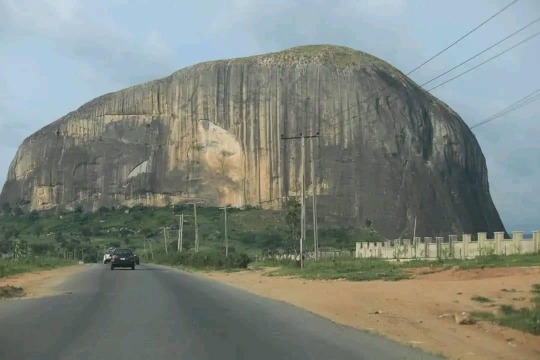
🌍 1) Largest country in Africa by land mass - Algeria 🇩🇿
2) Largest country in Africa by population - Nigeria 🇳🇬
3) Largest movie industry in Africa - Nigeria 🇳🇬
4) Largest democracy in Africa - Nigeria 🇳🇬
5) Richest Black man - Nigerian 🇳🇬
6) Richest African woman - Nigerian 🇳🇬
7) largest single solar power plant in Africa - Morocco 🇲🇦
8) Largest Museum in Africa - Egypt 🇪🇬
9) Tallest building in Africa - Egypt 🇪🇬
10) Largest rice mill in Africa - Nigeria 🇳🇬
11) Largest fertilizer plant in Africa - Nigeria 🇳🇬
12) largest oil refinery in Africa - Nigeria 🇳🇬
13) largest fish farm in Africa - Egypt 🇪🇬
14) largest cement plant in Africa - Nigeria 🇳🇬
15) largest tea farm in Africa - Kenya 🇰🇪
16) largest music industry in Africa - Nigeria 🇳🇬
17) largest stadium in Africa - South Africa 🇿🇦
18) Fastest train in Africa - Nigeria 🇳🇬
19) longest subsea gas pipeline in Africa - Nigeria 🇳🇬
20) largest city by population - Nigeria 🇳🇬
21) Largest news network in Africa - Nigeria 🇳🇬
22) largest car race arena in Africa - South Africa 🇿🇦
23) largest pharmaceutical industry in Africa - Nigeria 🇳🇬
24) Fastest woman in Africa - Nigerian 🇳🇬
25) Fastest man in Africa - Kenyan 🇰🇪
26) largest stock exchange by market capitalization in Africa - South Africa 🇿🇦
27) largest stock exchange by number of listings - south Africa 🇿🇦
28) longest concrete road in Africa - Nigeria 🇳🇬
29) largest airline in Africa - Ethiopia 🇪🇹
30) most streamed musicians in Africa - Nigeria 🇳🇬
31) most awarded artist in Africa - Nigerian 🇳🇬
32) largest mall in Africa by structure - Morocco 🇲🇦
33) most valuable tech startup in Africa - Nigeria 🇳🇬
34) most valuable company in Africa - South Africa 🇿🇦
35) largest economy in Africa - Nigeria 🇳🇬
36) Most tribes in Africa - Nigeria 🇳🇬
37) most languages in Africa - Nigeria 🇳🇬
39) largest seaport In Africa by size - Morocco 🇲🇦
40) largest university in Africa by area - Nigeria 🇳🇬
60 notes
·
View notes
Text
🇵🇸 🚨 GLOBAL PROTESTS STAND IN SOLIDARITY WITH PALESTINIANS UNDER SIEGE AND BOMBARDMENT IN THE GAZA STRIP 🇵🇸
A global strike has been launched, standing in solidarity with Palestinians under siege and bombardment in the Gaza Strip on Monday morning.
With #Strike_For_Gaza currently the largest trending hashtag internationally.
The General Strike takes place just two days after the United States used its veto power in the United Nations Security Council to kill a resolution calling for a ceasefire in Gaza.
In Palestine, protests swept the occupied West Bank, with Universities, banks and businesses closed and popular calls for confrontation with the occupation anywhere possible.
Public transportation was shut down on all routes while factories and plants were also closed.
In Lebanon, shops and stores were empty as the majority of the population participated in the strike, with only minimal movement through the streets of the Capital, Beirut, as well as other Lebanese cities.
After Lebanon's authorities approved participation in the General Strike, several corporations chose to close its doors in compliance, along with both public and private schools and other public administrations.
Lebanon's Ministry of Foreign Affairs and Expatriates also closed its doors in Lebanon, as well as its missions abroad in accordance with the memorandum of the Council of Ministers.
In Jordan, the General Strike was observed in the capital, Amman, and in Irbid in the north, where large numbers of businesses closed and pro-Palestine banners were erected in the streets.
A noticeable decrease in city traffic and the number of students in schools was noted, reflecting the high participation levels in the strike.
In Turkey, a significant number of shops and markets have been closed in solidarity with Palestine and in rejection of Israel's genocide in Gaza.
Protests are also ongoing in parts of Africa, with video showing a protest at the U.S. Embassy in Mauritania.
Nearly 18'000 Palestinians have been killed in Israel's genocidal war in Gaza, with another 47'000 wounded, 70% of whom are women and children, according to the Gaza Ministry of Health.
#source
#videosource1
@WorkerSolidarityNews
#gaza#strike for gaza#general strike#palestine protest#protests#politics#geopolitics#gaza strip#gaza news#palestine#solidarity with palestine#free palestine#free gaza#israel#israel news#israeli occupation#occupied palestine#news#middle east#war#wars#war news#world news#international news#global news#breaking news#current events#occupation#israel palestine conflict#conflict
75 notes
·
View notes
Text
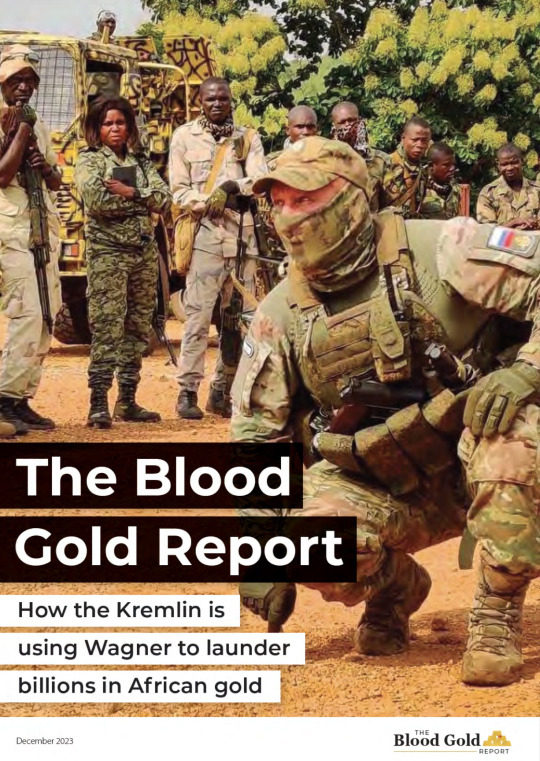
Executive summary
Since launching its brutal war of aggression against Ukraine in February 2022, the Russian Federation has been locked into a long and costly conflict. Russia has been diplomatically marginalized, subjected to sanctions, and shunned by most of the Western world. Many multinational companies have been forced by international pressure to shutter or sell their Russian operations, and profiting from cooperation with the Russian state is no longer considered acceptable. Russia has found itself in dire need of new allies and resources.
In this environment, the Kremlin-financed Private Military Company Wagner, or Wagner Group, has served as an increasingly important source of revenue for the Russian state. Founded in 2014 to support pro-Russian forces in Donbas, since then Wagner Group has evolved into a complex international network of private military contractors, disinformation campaign infrastruc-ture, and corporate front companies. It has deployed fighters, propaganda and disinformation campaigns, and financing as a proxy for the Russian state in numerous conflicts, from Syria and Libya to Mali, Central African Republic, and beyond
Wagner has most often been described as an independent mercenary group. This status has provided Russia with a thin veil of deniability, particularly in relation to the numerous plausible accusations of murder, rape, torture, and war crimes raised against Wagner fighters. But in reality, Wagner has always operated with the political and material backing of the Russian Federation to advance Russian state interests.
In Africa, Wagner has been deployed in a number of countries across the continent since 2017. In each country it enters, Wagner deploys military trainers, mercenary fighters, and propaganda experts to support anti-democratic regimes, drive instability, and commit human rights abuses. The mercenary group's ostensible provision of "security services" creates a framework for lucrative business contracts for the extraction of natural resources including diamonds, oil, timber, and especially gold.
This report focuses on the Kremlin's 'blood gold': Gold extracted from African countries and laundered into international markets that provides billions in revenue to the Russian state, thereby directly and indirectly financing Russia's war on Ukraine and global hybrid warfare infrastructure.
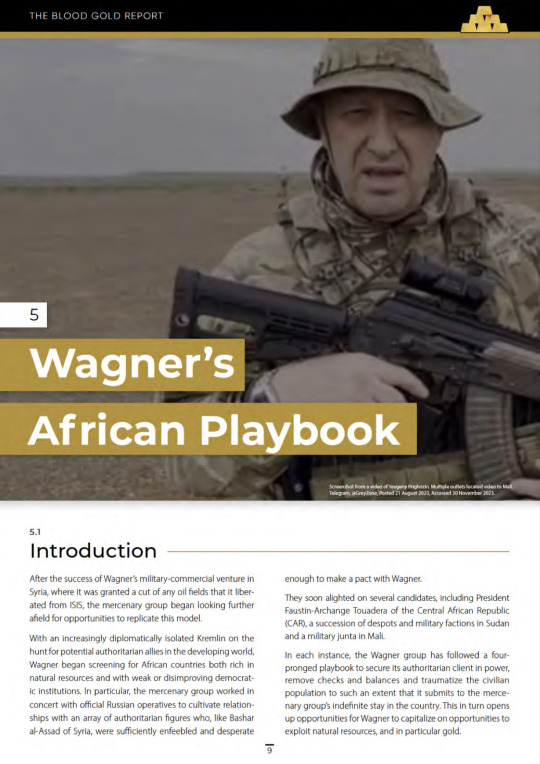
The Blood Gold Report's analysis suggests that Wagner and Russia have earned more than US$2.5 billion from blood gold since the full-scale invasion of Ukraine in February 2022. The report focuses on the case studies of Wagner's blood gold operations in the Central African Republic, Sudan, and Mali. In each of these coun-tries, Russia profits from the blood gold trade in different ways:
In CAR, the mercenary group has been granted exclusive extractive rights for the Ndassima mine, the country's largest gold mine, in return for propping up President Touadera's authoritarian regime. Wagner's Ndassima operations are understood to produce US$290 million of gold annually, while local miners have been pushed aside or murdered by the mercenary group.
In Sudan, through control of a major refinery, Wagner has become the dominant buyer of unprocessed Sudanese gold as well as a major smuggler of processed gold. Russian military transporter flights laden with gold have been identified by Sudanese customs officials. While tracking Sudan's unreported gold market is near impossible, estimates suggest that almost Us$2 billion in gold is smuggled out of the country unreported every year, with 'the Russian Company' in prime position to take advantage.
In Mali, Wagner is paid a monthly retainer - estimated at US $10.8 million per month - to prop up a brutal military junta Meanwhile the junta is in turn dependent on a small number of Western mining companies for the revenue it needs to pay Wagner. Mining companies contributed more than 50% of all tax revenues to the Malian state for 2022. Barrick Gold Corporation, a Canadian listed company and Mali's single biggest tax contributor, paid US$206 million in the first half of 2023 alone.
The junta is increasing its financial demands on gold mining companies. Meanwhile, the four largest gold mining companies (weighted by tax contribution) continue to plan further investments in the country, despite the well-documented abuses of the military junta and growing influence of the Wagner Group.
Wagner's blood gold operations in CAR and Sudan have been subject to sanctions, and the Kremlin-backed mercenaries have developed increasingly complex smuggling routes and corporate subterfuge tactics to move blood gold out of these countries and convert this gold into cash.
In contrast, the Malian blood gold system enables Wagner to remain one degree removed from gold production. Instead, legitimate multinational mining companies convert gold into cash for the Malian military junta without triggering international sanctions.
To secure its position in a target country's political and natural resource extraction landscape, Wagner's African playbook consists of a four-pronged attack on the host country's civic institutions and civilian population - suppressing political opposition, spreading disinformation, silencing free media and terrorising civilians.
The ultimate objective of Wagner's playbook is to increase its clients' dependence on Wagner forces to stay in power, thereby securing a long-term revenue stream for the Kremlin and fostering authoritarianism and instability throughout the region as part of Russia's wider geopolitical strategy to distract and bog down the democratic West.
Since the death of Wagner's leader Yevgeny Prigozhin, the mercenary group has formally come under the control of the Russian State. Yet the Kremlin's focus on Africa, and its blood gold operations, show no signs of changing.
(continue reading)
#politics#ukraine#russia#africa#wagner group#syria#libya#russian imperialism#russian colonialism#blood gold#money laundering#mercenaries#barrick gold#barrick gold corporation#russia is a terrorist state#russian fascism ☭
34 notes
·
View notes
Text
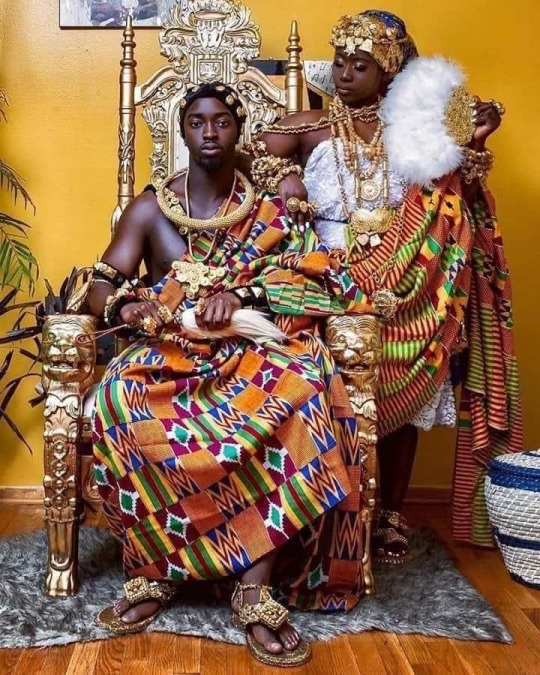
Facts about Ghana in West Africa 🇬🇭 You may not know:
1. Ghana 🇬🇭 passp0rt is ranked 4th as the most powerful passp0rt in West Africa. Source: Bennjamindada.com
2. Most number of best sec0ndary schools in west africa, Ghana 🇬🇭top the list.
3. Best infrastructure In West Africa ranked by Africa Infrastructure Development Index(AIDI) , Ghana is the second best after Cape verde In West Africa.
4. Ghana🇬🇭 is ranked the most peaceful country in west Africa.
5. Ghana🇬🇭 has the 2nd biggest economy in west Africa after Nigeria 🇳🇬.
6. Ghana 🇬🇭 cedi ranked as the strongest currency in West Africa. (Strongest is different from Best Performing)
7. The largest port in west and central Africa is found in Ghana🇬🇭 (Tema port). 2020
8. The best Airport in west Africa is found in Ghana 🇬🇭 " Kotaka international Airport".
9. Ghana 🇬🇭 and cape verde are the only c0untries in wèst ranked with middle-best quality of life.
10 Accra🇬🇭 is the best place to move to In west Africa and the most visited place in West Africa , also the second richest city in west after Lagos.
11. Ghana 🇬🇭 is West Africa country with highest Eur0peans p0pulation.
12. Largest Social Science faculty building in west is found in Ghana, KNUST.
13. Biggest mall in west Africa is in Ghana 🇬🇭, West Hills malls and Ghana International Mall.
14. Biggest artificial lake in the world, lake Volta is in Ghana 🇬🇭.
15. Biggest indoor market, Kumasi Central market is Ghana 🇬🇭.
16. Biggest hotel in Africa, the rock city hotel is Ghana 🇬🇭
17. Biggest interchanges in West Africa, Pokuase Interchange is in Ghana 🇬🇭.
18. Longest canopy walk way at Peninsula Resort is in Ghana 🇬🇭.
19. Best Beaches ⛱ are in Ghana.
20. Biggest dam in West Africa is Ghana 🇬🇭.
21. Largest drone delivery system in the world is Ghana 🇬🇭.
22. Ghana has the highest percentage of people having access to elèctricity (85%) and wàter💧.
56 notes
·
View notes
Text
We are Israel's largest human rights group [B’Tselem] – and we are calling this apartheid by Hagai El-Ad
One cannot live a single day in Israel-Palestine without the sense that this place is constantly being engineered to privilege one people, and one people only: the Jewish people. Yet half of those living between the Jordan River and the Mediterranean Sea are Palestinian. The chasm between these lived realities fills the air, bleeds, is everywhere on this land.
I am not simply referring to official statements spelling this out – and there are plenty, such as prime minister Benjamin Netanyahu’s assertion in 2019 that “Israel is not a state of all its citizens”, or the “nation state” basic law enshrining “the development of Jewish settlement as a national value”. What I am trying to get at is a deeper sense of people as desirable or undesirable, and an understanding about my country that I have been gradually exposed to since the day I was born in Haifa. Now, it is a realisation that can no longer be avoided.
Although there is demographic parity between the two peoples living here, life is managed so that only one half enjoy the vast majority of political power, land resources, rights, freedoms and protections. It is quite a feat to maintain such disfranchisement. Even more so, to successfully market it as a democracy (inside the “green line” – the 1949 armistice line), one to which a temporary occupation is attached. In fact, one government rules everyone and everything between the river and the sea, following the same organising principle everywhere under its control, working to advance and perpetuate the supremacy of one group of people – Jews – over another – Palestinians. This is apartheid.
There is not a single square inch in the territory Israel controls where a Palestinian and a Jew are equal. The only first-class people here are Jewish citizens such as myself, and we enjoy this status both inside the 1967 lines and beyond them, in the West Bank. Separated by the different personal statuses allotted to them, and by the many variations of inferiority Israel subjects them to, Palestinians living under Israel’s rule are united by all being unequal.
Unlike South African apartheid, the application of our version of it – apartheid 2.0, if you will – avoids certain kinds of ugliness. You won’t find “whites only” signs on benches. Here, “protecting the Jewish character” of a community – or of the state itself – is one of the thinly veiled euphemisms deployed to try to obscure the truth. Yet the essence is the same. That Israel’s definitions do not depend on skin colour make no material difference: it is the supremacist reality which is the heart of the matter – and which must be defeated.
Until the passage of the nation state law, the key lesson Israel seemed to have learned from how South Africa’s apartheid ended was to avoid too-explicit statements and laws. These can risk bringing about moral judgments – and eventually, heaven forbid, real consequences. Instead, the patient, quiet, and gradual accumulation of discriminatory practices tends to prevent repercussions from the international community, especially if one is willing to provide lip service to its norms and expectations.
This is how Jewish supremacy on both sides of the green line is accomplished and applied.
We demographically engineer the composition of the population by working to increase the number of Jews and limit the number of Palestinians. We allow for Jewish migration – with automatic citizenship – to anywhere Israel controls. For Palestinians, the opposite is true: they cannot acquire personal status anywhere Israel controls – even if their family is from here.
We engineer power through the allocation – or denial – of political rights. All Jewish citizens get to vote (and all Jews can become citizens), but less than a quarter of the Palestinians under Israel’s rule have citizenship and can thus vote. On 23 March, when Israelis go and vote for the fourth time in two years, it will not be a “celebration of democracy” – as elections are often referred to. Rather, it will be yet another day in which disfranchised Palestinians watch as their future is determined by others.
We engineer land control by expropriating huge swaths of Palestinian land, keeping it off-limits for their development – or using it to build Jewish towns, neighbourhoods, and settlements. Inside the green line, we have been doing this since the state was established in 1948. In East Jerusalem and the West Bank, we have been doing this since the occupation began in 1967. The result is that Palestinian communities – anywhere between the river and the sea – face a reality of demolitions, displacement, impoverishment and overcrowding, while the same land resources are allocated for new Jewish development.
And we engineer – or rather, restrict – Palestinians’ movement. The majority, who are neither citizens nor residents, depend on Israeli permits and checkpoints to travel in and between one area and another, as well as to travel internationally. For the two million in the Gaza Strip travel restrictions are the most severe – this is not just a Bantustan, as Israel has made it one of the largest open-air prisons on Earth.
Haifa, my birth city, was a binational reality of demographic parity until 1948. Of some 70,000 Palestinians living in Haifa before the Nakba, less than a 10th were left afterwards. Almost 73 years have passed since then, and now Israel-Palestine is a binational reality of demographic parity. I was born here. I want – I intend – to stay. But I want – I demand – to live in a very different future.
The past is one of traumas and injustices. In the present, yet more injustices are constantly reproduced. The future must be radically different – a rejection of supremacy, built on a commitment to justice and our shared humanity. Calling things by their proper name – apartheid – is not a moment of despair: rather, it is a moment of moral clarity, a step on a long walk inspired by hope. See the reality for what it is, name it without flinching – and help bring about the realisation of a just future.
#reaux speaks#resources#B’Tselem#israel#human rights#apartheid#south africa#palestine#the guardian#article#gaza#jewish#palestinian#anti zionism#zionism#free palestine
52 notes
·
View notes
Text
Discover Bolivia: Your Ultimate Travel Guide
A Glimpse into Bolivia’s Rich History
Bolivia, a landlocked country in South America, boasts a diverse and rich history. It was originally inhabited by ancient civilizations, including the Tiwanaku and the Inca Empire. Spanish conquistadors arrived in the 16th century, leading to centuries of colonial rule. Bolivia gained independence in 1825 but has since experienced a turbulent political…
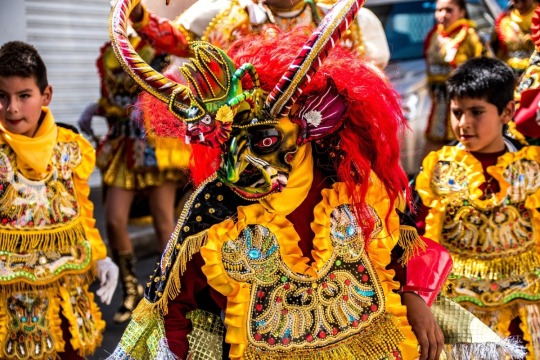
View On WordPress
#a landlocked country in South America#adventure#africa#and activities#and local markets. Adventure Sports: Mountain biking on the infamous Death Road. Wildlife Watching: Spot exotic animals in the Amazon Basin.#and quinoa. Popular dishes include salteñas (empanadas)#and respect local customs. Accommodation Affordability Bolivia offers a range of accommodation options#and sopa de maní (peanut soup). Cultural events and festivals#and sopa de maní for a taste of traditional Bolivian cuisine. 7. Can I use credit cards in Bolivia? Credit cards are widely accepted in majo#and taxis or ride-sharing services are available in cities. Religion Catholicism is the predominant religion#anticuchos#anticuchos (grilled meat skewers)#are also widely spoken. Embark on your Bolivian adventure with this comprehensive guide and immerse yourself in the rich history#be cautious with your belongings#boasts a diverse and rich history. It was originally inhabited by ancient civilizations#but exercise usual precautions. Avoid walking alone at night#but Indigenous beliefs and practices are also widely observed#but it&039;s advisable to carry cash#but it&039;s best to check specific requirements beforehand. 2. What is the best time to visit Bolivia? The dry season from May to October#but many Indigenous languages#but requirements vary by nationality. US citizens#but take usual precautions against petty crime. Avoid demonstrations#carry cash for remote regions and small transactions. Top Places to Visit 1. Salar de Uyuni The world&039;s largest salt flat offers stunni#challenges like rural access and educational quality persist. Universities in major cities offer higher education opportunities. Visa and En#colonial cities#corn#creating a unique cultural blend. Food and Culture Bolivian cuisine is diverse#destinations#Discover Bolivia: Your Ultimate Travel Guide A Glimpse into Bolivia&039;s Rich History Bolivia#especially during the rainy season when it reflects the sky. 2. La Paz The administrative capital
0 notes
Text
Spec Vault, Black carpo
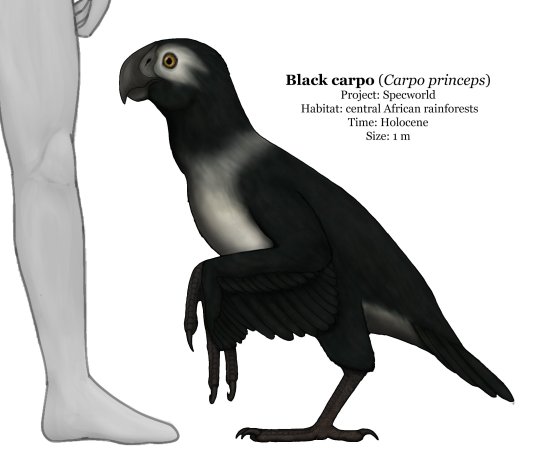
Among my first reworks of my original size chart spec critters, a funny creature and among my favorite alt evo theropods from the iconic Speculative Dinosaur Project.
The Black Carpo is a very large type of "avian ape" inhabitant of the jungles of africa if not the largest species, this animal belongs to an unusual group of arboreal dwelling avian theropod known as Xenornithes, a group that diverged from basal birds on the cretaceous (being relatives to Confuciusornithids) with the unique feature of develop functional hands to grasp through the branches of trees and being secondarily flightless.
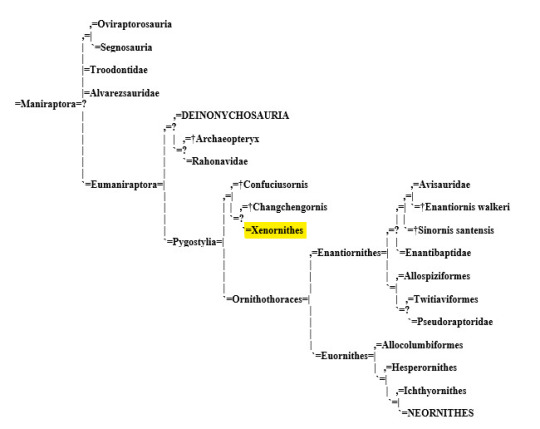
The Xenornithes evolved around the paleogene with their oldest fossil record extending up to the Eocene, from other families that evolved in that time and perished only two clades remains of these, the more bird-like Bunglebirds (Xenornithiformes) and the Carpos (Pithecaviformes) which are totally flightless and developed their wings into formidable arms, resembling a cross of an ape, a penguin and a parrot.
The name of this species came out of the misidentification of the first specimens by "Specworld researchers" which were actually black-plumed melanistic, when in reality the species in general posses market white eyerings that branch in dual stripes on the back, with a dim grey neck ring and a white chest and belly.
Originally created by
Osmatar/Mette Aumala https://www.deviantart.com/osmatar/art/The-Black-Carpo-264736143
92 notes
·
View notes
Text
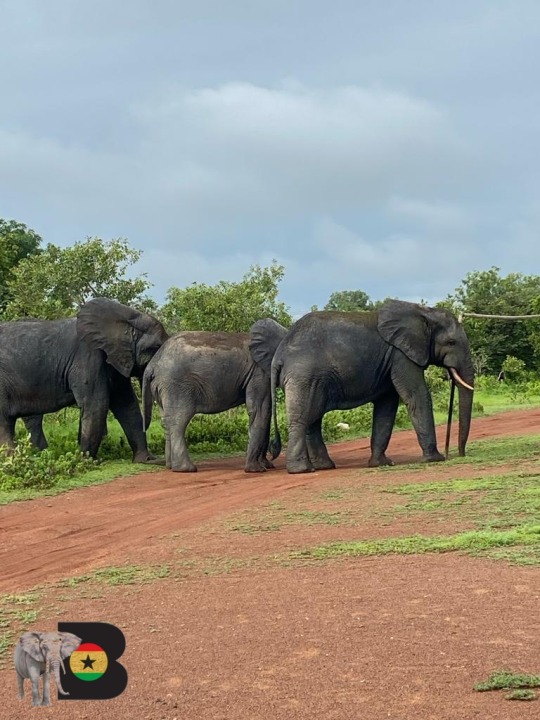
Discover the Essence of Ghana Vibrant Cities, Serene Beaches, and Rich Traditions.
Ghana, a country in West Africa, is a treasure trove of cultural diversity, natural beauty, and vibrant cities. From the bustling streets of Accra to the serene beaches of Cape Coast, Ghana has something for everyone. In this blog post, we'll take you on a journey through the best of Ghana, exploring its rich traditions, stunning landscapes, and vibrant cities.
Vibrant Cities
Ghana's cities are a fusion of traditional and modern culture. Accra, the capital city, is a must-visit, with its vibrant markets, historical landmarks, and nightlife. Kumasi, the cultural hub, is home to the Ashanti Kingdom and its rich heritage. Tamale, in the north, is a melting pot of cultures, with a unique blend of traditional and modern architecture.
Serene Beaches
Ghana's coastline offers a relaxing escape from the hustle and bustle of city life. Cape Coast, with its stunning beaches and historic castles, is a popular destination. Elmina, with its picturesque fishing village and beautiful beaches, is another must-visit. Busua, a serene beach town, is perfect for relaxation and water sports.
Rich Traditions
Ghana is renowned for its rich cultural heritage. The Ashanti Kingdom, with its vibrant Kente cloth and traditional drumming, is a highlight. The Akwasidae festival, celebrated by the Ashanti people, is a colorful display of traditional dance, music, and costume. The Ewe people, in the east, have a unique tradition of storytelling and music.
Natural Beauty
Ghana's natural beauty is breathtaking. The Volta Lake, the largest man-made lake in the world, is a stunning sight. The Afadjato Mountain, the highest peak in Ghana, offers breathtaking views. The Wli Waterfalls, in the east, are a scenic delight. The Mole National Park, in the north, is home to a diverse range of wildlife.
Ghana is a country that has something for everyone. From vibrant cities to serene beaches, rich traditions to natural beauty, Ghana is a destination that will leave you in awe. With Best Ghana Tours, you can experience the best of Ghana, with our expert guides and carefully curated tour packages. So why wait? Book your Ghana tour today with Best Ghana Tours to discover the essence of Ghana!
#bestghanatours#travel#tourism#tour package#ghana#accra ghana#travelwithus#tourist#worldwide privacy tour#summer#all inclusive#accra#activity#tamale#landscape#europe#africa#beauty#nature#wildlife#culture#cape coast#heritage#yearofreturn#beyondthereturn#new york#united states
15 notes
·
View notes
Text
Three Mexican suspects were arrested with two South Africans when elite police units raided a multimillion-dollar crystal meth lab hidden in a remote farm north of Johannesburg, police said Tuesday.
The owner of the farm near Groblersdal, about 125 miles from Johannesburg, was among four men arrested on Friday, police said.
A third Mexican was picked up on Monday, the spokeswoman for the elite Hawks unit told AFP.
"The drugs were obviously intended for local and international sale," Brigadier Thandi Mbambo told AFP, adding that the manufacturing facility was operating "at a large scale."
Authorities also seized large quantities of chemicals used to manufacture illicit drugs, including crystal meth and acetone, valued at around two billion rands (more than $100 million), police said.
The Hawks and other specialized units raided the farm in the Limpopo province after a tip-off of suspicious activity there. Police photographs showed the operation was fairly sophisticated and included large machinery.
So far this year, the Hawks have uncovered ten 10 clandestine drug laboratories and made 34 arrests, police said in a statement.
South Africa is a major consumer of meth and the market is growing in neighboring countries and elsewhere in the region, according to a 2021 report by the Global Initiative Against Transnational Organized Crime.
"The consumer base for meth in South Africa appears to be significantly greater than initially imagined, marking it potentially among the largest meth consumer markets in the world," the report says.
The United Nations Office on Drugs and Crime said in a 2023 report that South Africa is an appealing hub for illicit drugs destined for other countries.
"South Africa's geography, porous borders and international trade links with Asia, Latin America, Western Europe and North America have made it an attractive drug transit country," the report says
The country's ports are believed to regularly receive containers of cocaine that are in transit and do not even land ashore, the drugs agency said.
The crystal meth bust in South Africa comes about two months after police in Spain said they had seized 1.8 tons of crystal meth that Mexico's Sinaloa Cartel was trying to sell in Europe, the country's "biggest-ever seizure" of the narcotic.
9 notes
·
View notes
Text


Lesotho's 🇱🇸 Marijuana Exportation to hit US$3.67m this year.
Kingdom of Lesotho exported estimated 8.5 tones of medicinal marijuana to North Macedonia.
It is the world's largest single legal cannabis export so far.
Lesotho export in Marijuana is expected to see significant growth in its cannabis market. this 2024, revenue in the cannabis market is projected to reach US$3.67m. This is expected to increase at an annual growth rate of 1.48%, resulting in a market volume of US$3.95m by 2029.
It exports Non psychoactive cannabidiol (CBD) oil extracts and other medical cannabis products primarily to South Africa and is working on entering markets in Europe and the Middle East, as well as Australia.
It's the country most significant cash-crop. In the 2000s it was estimated that 70% of the cannabis in South Africa originated in Lesotho.
Lesotho made history by becoming the first certified African country to supply the European Union with cannabis for pharmaceutical use.
In 2017 Lesotho became the first African country to allow the cultivation of cannabis for medicinal purposes. Then Deputy health minister Manthabiseng Phohleli told AFP that the legalization of cannabis presented “a huge opportunity for the country”, which boasts 300 days of sunshine per year
-- African Hub
10 notes
·
View notes